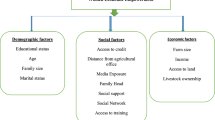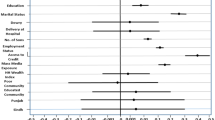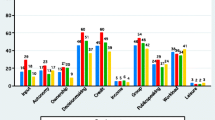Abstract
Gender equality and women’s development are the paramount objectives for the sustainable development of the mankind. The influence of women’s rights and status on their family livelihood has been widely discussed in the academia. Based on the field survey questionnaire data from 796 farmers in China’s Three Gorges Reservoir Region, we firstly introduced the psychological capital into the analysis of farmers’ livelihood and constructed a farmers’ livelihood index, then we analyzed the impact of women’s empowerment on the livelihood of farmers by adopting OLS and quantile regression. The results show that: (1) women’s empowerment has a significantly positive effect on the livelihood of the farmer family, (2) their family decision-making power and educational investment can be promoted to narrow the gap between rich and poor among farmers, (3) compared with the elderly female labor force, women’s empowerment has a more significant influence on the livelihood of the family with younger female labor force, and (4) improving farmers’ psychological capital can also make a contribution to their livelihood. Finally, we proposed relevant policy recommendations accordingly based on the findings of this research.

Similar content being viewed by others
References
Alkire, S.: The women’s empowerment in agriculture index. World Dev. 52, 71–91 (2013)
Allahdadi, F.: Towards rural women’s empowerment and poverty reduction in Iran. Life Sci. J. 8(2), 213–216 (2011)
Alshami, S.S.A.: The effect of microfinance on women’s empowerment: evidence from malaysia. Asian J. Women’s Stud. 22(3), 318–337 (2016)
Bushra, A.: Assessing the socio-economic determinants of women empowerment in Pakistan. Proc. Soc. Behav. Sci. 177, 3–8 (2015)
Cherayi, S.: Empowerment and social inclusion of Muslim women: towards a new conceptual model. J. Rural Stud. 45, 243–251 (2016)
Dol, J.: Stitching toward empowerment: a case study of Tabiro Ladies’ Club. J. Co-op. Org. Manag. 1(2), 70–80 (2013)
Duflo, E.: Women empowerment and economic development. J. Econ. Lit. 50(4), 1051–1079 (2011)
Gao, C.: Education of rural women in poor areas and its impact on rural economic development: a case study of central Gansu Province. Chin. Rural Econ. 9, 67–74 (2004)
Gao, Y.: Women and development of poor areas. China Rural Surv. 3, 49–52 (1997)
Grabe, S.: An empirical examination of women’s empowerment and transformative change in the context of international development. Am. J. Community Psychol. 49(1), 233–245 (2012)
Green, E.P.: Women’s entrepreneurship and intimate partner violence: a cluster randomized trial of microenterprise assistance and partner participation in post-conflict Uganda. Soc. Sci. Med. 133, 177–188 (2015)
Gu, Y.: Research on women’s poverty in extremely difficult areas: a perspective of sustainable livelihood. Jianghan Tribune 6, 136–140 (2014)
Hazarika, B.: Do home-based micro-entrepreneurial earnings empower rural women? evidence from the handloom sector in assam. Asian J. Women’s Stud. 22(3), 289–317 (2016)
Jia, H.: Farmers’ welfare changes and it influencing factors before and after residents concentration: a case study in Jiangsu Province. China Rural Surv. 1, 26–39 (2014)
Khan, I.A.: Determinants of women’s empowerment and poverty reduction: a case study of rural Faisalabad, Punjab. Pak. J. Agric. Sci. 54(1), 217–225 (2017)
Koenker, R.: Regression quantiles. Econometrica 46(1), 33–50 (1978)
Lenao, M.: Ecotourism development and female empowerment in Botswana: a review. Tourism Manag. Perspect. 18, 51–58 (2016)
Li, C.: Individual and family factors determining female labor force leaving western rural mountainous areas. Women’s Stud. 4, 35–43 (2010)
Li, W.J., Shuai, C.M., Shuai, Y., et al.: Empirical study on the poverty identification and poverty reduction paths of immigrants in the Three Gorges Reservoir Region[J]. China Popul. Resour. Environ. 6, 136–144 (2017)
Liu, A.: The present situation of gender attitudes and the factors influencing them: based on the third survey of women’s status in China. Soc. Sci. China 2, 116–129 (2014)
Liu, L.: Women’s entitlement and fertility control in poverty-stricken areas. South. Popul. 1, 22–27 (2001)
Moghadam, V.M.: Measuring women’s empowerment: participation and rights in civil, political, social, economic, and cultural domains. Int. Soc. Sci. J. 2, 203–226 (2005)
Olivier, D.W., Heinecken, L.: Beyond food security: women’s experiences of urban agriculture in Cape Town[J]. Agric. Hum. Values 34(3), 1–13 (2017)
Sengupta, N.: Poor women’s empowerment: the discursive space of microfinance. Indian J. Gender Stud. 20(2), 279–304 (2013)
Serrano-Cinca, C.: Microfinance, the long tail and mission drift. Int. Bus. Rev. 23(1), 181–194 (2014)
Setyaningsih, S.: Women empowerment through creative industry: a case study. Proc. Econ. Finance 4(29), 213–222 (2012)
Sharaunga, S.: Effects of ‘women empowerment’ on household food security in rural kwazulu-natal province. Dev. Policy Rev. 34(2), 223–252 (2016)
Shuai, C.: Estimation on poverty reduction efficiency of IFAD-supported projects in rural China: based on panel data of 1356 households in seven provinces. Manag. World 3, 73–86 (2016)
Wang, Z.: Determinant factors of China’s rural old age impoverished female: an application of cox proportion risk model. Chin. J. Popul. Sci. 1, 75–83 (2010)
Xie, J., Cai, Y.Y.: Dynamic response relation between farmers’ livelihood assets and farmland protection compensation policy effects[J]. China Land Sci. 2017
Yao, D.: Dilemmas of rural women’s development and policy adjustment in the visual field of feminization of agriculture-based on Amartya Sen’s theory of development as freedom. Lanzhou Acad. J. 8, 74–78 (2012)
Zeweld, W., Huylenbroeck, G.V., Tesfay, G., et al.: Smallholder farmers’ behavioural intentions towards sustainable agricultural practices[J]. J. Environ. Manage. 187, 71–81 (2017)
Zhong, W.: Endowment effect, property strength and restraint of agricultural land transfer: farmer household’s survey data from Guangdong Province. Issues Agric. Econ. 3, 6–16 (2013)
Acknowledgement
This research is supported by the Major Program of National Social Science Foundation of China (NSSFC): Systematic Evaluation on the Operating Mechanism of Poverty Reduction Performances of Solar PV Projects and Policy Innovations (Grant No. 17ZDA085); the project from the Natural Science Foundation of China (NSFC) (Grant No. 71773119); and the Fundamental Research Funds for China’s Central Universities (Grant No. G1323521714): Research on the Complementarity and Cooperation Potential between China and the “Belt and Road” Countries.
Author information
Authors and Affiliations
Corresponding author
Rights and permissions
About this article
Cite this article
Shuai, Y., Shuai, Cm., Li, Wj. et al. Role of women’s empowerment in improving farmer’s livelihood: empirical evidence from China. Qual Quant 53, 621–639 (2019). https://doi.org/10.1007/s11135-018-0778-6
Published:
Issue Date:
DOI: https://doi.org/10.1007/s11135-018-0778-6




